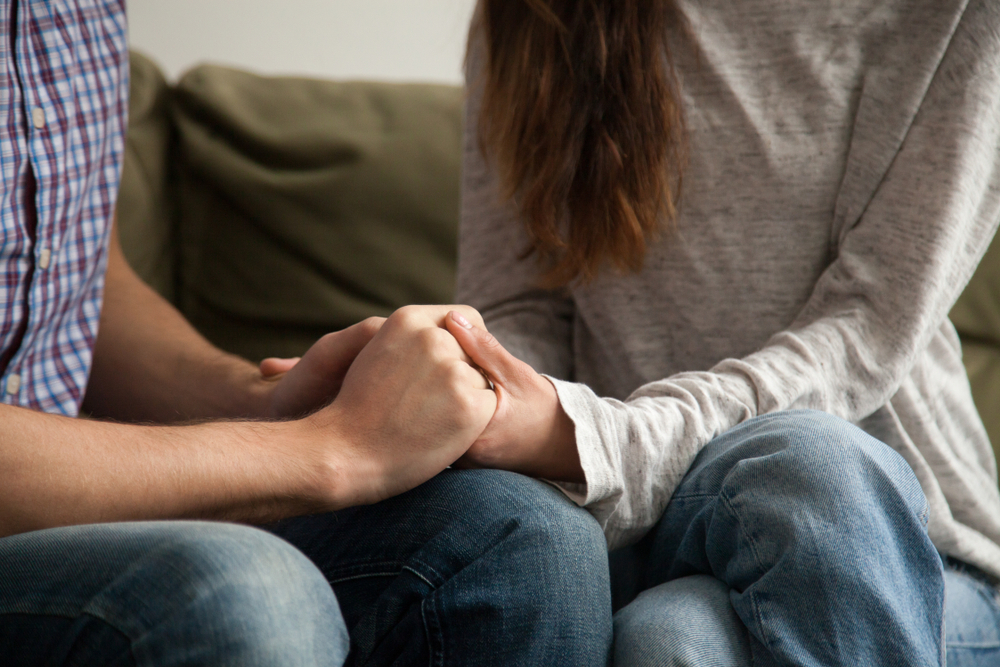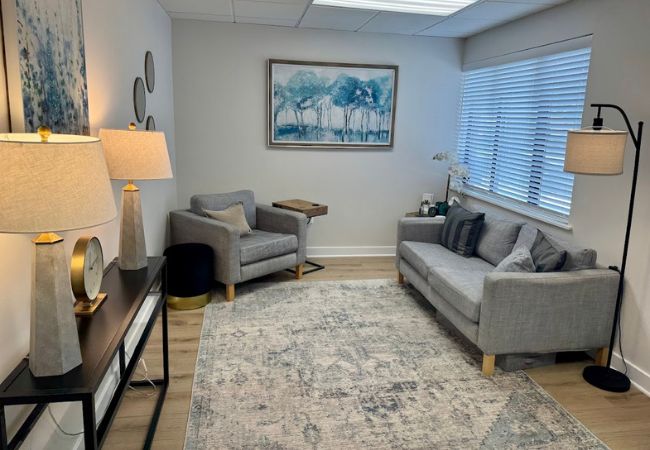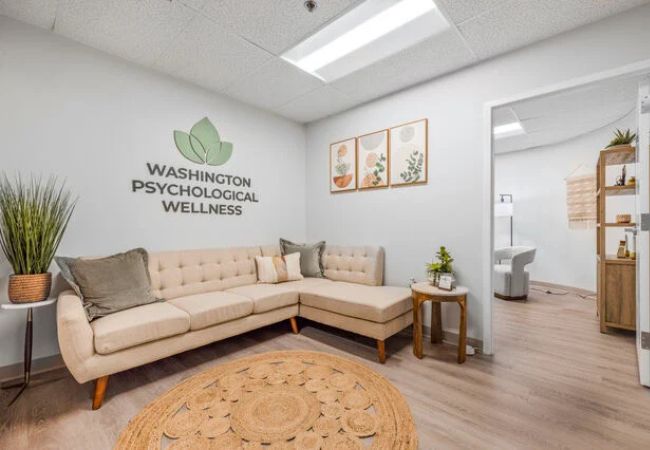Couples Therapy

Couples Therapy
In couples therapy, our clinicians will facilitate communication between you and your partner to uncover the roots of the conflict you’re having, help you understand each others’ feelings, and change behavior to meet each others’ needs better.
Some concerns our clinicians can help you with during couples therapy:
- Conflict and disagreements
- Difficulty communicating
- Sexual concerns or lack of sex in a relationship
- Healing from an affair
- Multicultural relational problems
You may fear that talking about your relationship issues is going to make them worse. Sometimes things feel worse before they feel better, but most couples experience greater understanding and closeness as a result of therapy.
Communication Issues
Couples therapy can help couples improve their communication skills and learn effective ways to express their thoughts, feelings, and needs to each other. It can address difficulties in listening, speaking, and understanding each other’s perspectives.
Conflict Resolution
Therapy can assist couples in developing healthy strategies for resolving conflicts and disagreements. It can provide tools and techniques to manage conflicts constructively and avoid destructive patterns such as criticism, defensiveness, contempt, and stonewalling.
Intimacy & Connection
Couples therapy can help partners deepen their emotional and physical intimacy. It can address issues related to trust, emotional vulnerability, sexual difficulties, and connection, helping couples rekindle their bond and enhance their overall relationship satisfaction.
Trust Betrayal
If trust has been compromised due to infidelity, deception, or other breaches of trust, couples therapy can provide a safe space to explore the underlying issues and work towards rebuilding trust. It can help partners heal from the pain of betrayal and move towards forgiveness and reconciliation.
Pre-marital Counseling
Couples therapy is beneficial for engaged or pre-marital couples as it helps them explore important topics such as expectations, roles, values, and goals. It can provide a foundation for a healthy and successful marriage by addressing potential areas of conflict and helping couples develop effective communication and problem-solving skills.
Parenting Challenges
Therapy can support couples in navigating parenting challenges, such as differences in parenting styles, discipline issues, or conflicts arising from different approaches to raising children. It can help parents improve their co-parenting relationship and create a harmonious and supportive environment for their children.
Life Transitions
Couples therapy can be helpful during significant life transitions, such as career changes, relocation, loss of a loved one, or becoming empty nesters. It can provide support and guidance as couples adjust to new roles, responsibilities, and dynamics, minimizing stress and strengthening their relationship in the face of change.
Three Easy Ways To Connect With Us

Washington Psychological Wellness Gaithersburg

Washington Psychological Wellness Rockville

Washington Psychological Wellness Telehealth
We Offer Telehealth Throughout Maryland
Frequently Asked Questions About Couples Therapy
How can Couples/Marriage Counseling & Therapy help my relationship?
When you’re struggling in your relationship, you may feel as though you’re trapped in a perpetual state of conflict, continually bumping up against the same old negative patterns that play out between you and your partner. However, couples/marriage counseling and therapy can help you identify the emotions and the unfulfilled needs, wants, and desires that may be driving the discord in your relationship or marriage. With the help of a couples counselor, you and your partner can express your emotions and tell your life stories without fearing blame or criticism. Through a thoughtful process of introspection, you can begin to recognize and honor each other’s experiences and cultural backgrounds, as well as explore any past traumatic experiences that may be influencing the way you relate to the people you love. Doing so can help you engender more empathy and understanding in your relationship, in addition to challenging any negative beliefs you have about yourself and your partner.
Couples/Marriage Counseling & Therapy will help you:
- Improve communication and reduce conflict and reactivity
- Understand patterns of relating that are habit and how to adopt more productive ones
- Practice skills that encourage empathy, understanding, safety, and friendship
- Decide what family dynamics and behaviors each bring to the relationship and how they affect the other person
- Resolve long-standing differences to heal old, painful hurts
- Revise what you want the relationship to look like and learn specific skills to ensure that each person’s needs are met
- Learn how to meet your partner’s needs without resentment
- Rebalance roles and responsibilities to create more equality and fairness
- Learn how to have fun again
- Learn how to start anew after a crisis, such as an infidelity or loss
- Feel safe and connected again – both emotionally and physically
Is relationship conflict normal?
If you’re feeling ashamed of the level of conflict in your relationship or marriage, the good news is you’re not alone. Almost every couple has disagreements, which seems to be a natural byproduct of living and loving together.
In a relationship, each partner brings to the table a unique set of experiences, values, personality traits, and cultural backgrounds. These differences can cause you to clash with your partner. You may start to argue about fundamental lifestyle choices, such as the proper way to raise your children, the best way to manage your finances, or the relative level of autonomy and closeness you want to experience in the relationship.
The mere fact that conflict exists in your relationship is not a cause for concern. However, what can determine the overall health of your relationship is how you choose to manage conflict.
Thankfully, Washington Psychological Wellness can provide you with the tools you need to manage conflict better and make your disagreements more productive.
Couples/Marriage Counseling & Therapy hasn't worked for us before; why will it work for us now?
Sometimes therapy doesn’t work because the timing is off. Maybe one or both of you weren’t ready to make the commitment to treatment in the past. Or, perhaps you didn’t stick with treatment long enough to solve the deeper issues, so you reverted into past negative patterns once you ended therapy. Maybe the therapist or the therapist’s style or methods were not the right fit for you.
Just because you didn’t get the results from therapy that you hoped for in the past doesn’t mean you won’t get better results this time. Like anything in life, if you don’t get what you want or need, it’s important to keep trying.
At Washington Psychological Wellness, our couples/marriage counselors and therapists will work with you and your partner to ensure that your goals and expectations are appropriately discussed and addressed.
Will the couples/marriage counselor or therapist take sides in certain instances?
At Washington Psychological Wellness, we offer a warm, compassionate, and judgment-free approach.
Your counselor or therapist will remain neutral throughout the process and will never take sides. Rather than blaming one person for the problems in your relationship, your counselor will show you how both parties contribute equally to conflict. We offer a safe and supportive environment where you’ll be free to both laugh and cry and say that things you always wanted to say but were perhaps too afraid to express. Our strength-based and client-centered approach help clients identify their goals and find the answers to their questions.
Is it okay if we talk about intimacy?
Absolutely!
Our couples/marriage counselors & therapists encourage open, authentic communication in all counseling areas, including intimacy. Intimacy—whether it be sexual, emotional, physical, or spiritual—is a critical component of couples work. Modern science has shown a direct correlation between sexual intimacy and the emotional bond. A secure personal connection between partners has proven to strengthen a couples’ sexual intimacy, connectivity, satisfaction, and even pleasure. The same was true vice versa—healthy sexual intimacy was correlated with robust emotional connectivity and bond.
At Washington Psychological Wellness, our clinicians understand that a lack of intimacy in any one area of the relationship begets an even lower lack of intimacy in other areas. By healing the emotional bond between you and your partner, you are also strengthening all areas of intimacy. Our clinicians provide a supportive environment and want both individuals to feel safe communicating about their intimacy frustrations and their hopes for intimacy. Our couples often report having more effective communication, feeling more connected, and being more intimate and fulfilled.
Is couples/marriage counseling & therapy going to save my relationship?
Couples/marriage counseling and therapy help couples who experience relationship challenges such as repetitive arguments, distance, anger, and feelings of resentfulness, dissatisfaction, and hostile communication patterns. Working with a therapist, you and your partner have the opportunity to go beyond surface emotions and express deeper feelings. The goals are for the couple to communicate effectively, learn healthy conflict resolution skills, and rebuild intimacy and trust. For couples in long-term relationships, ongoing issues can be more safely discussed in the presence of a neutral and compassionate couples counselor.
According to the American Association of Marriage and Family Therapy, research indicates that couples counseling helps relationships. At the end of couples therapy, more than 75% of couples were better off than those in the same situation that did not receive counseling. 65% of couples reported a “significant” improvement in relationship satisfaction. We cannot promise that therapy will “save” your relationship. However, you and your partner can make couples counseling more effective by committing to counseling, acknowledging that challenges and the need for greater relationship satisfaction exist, and being open to the process and idea that change takes some time.
What should we expect in couples/marriage counseling & therapy?
Through couples/marriage counseling and therapy, you will learn to see how each of you plays a role in your relationship’s problems. As each of you takes responsibility for your part in creating the dynamics at hand, you will each begin to heal the trust within the relationship and restore a deep sense of intimacy and love. With our therapists’ guidance, you will learn to communicate openly in a safe environment and begin to uncover the root of the problems you are experiencing. We will help you identify where your relationship is stuck and how to change the dynamics. We will explore how past experiences contribute to differing expectations about behavior, communication, and conflict resolution in a relationship. As you become aware of the assumptions you carry into the relationship, you can create a new set of expectations that you both understand and support. Through couples therapy, we will help you dispel the fears that lead couples to be defensive with one another and teach you how to communicate in new ways. In doing so, you will begin to express your love freely again — and to regain a deeper, more satisfying relationship.
When is the right time to seek a couples/marriage counselor or therapist?
- Do you feel stuck in negative patterns in your relationship or marriage?
- Are conflicts between you and your partner growing increasingly hostile?
- Do you and your partner have fundamental differences in opinion regarding things like parenting, finances, and laws?
- Do you often feel hurt, belittled, and ashamed in your relationship?
- Do you fear that you might have chosen the wrong partner?
- Do you long to rekindle love, admiration, and mutual respect in your relationship or marriage but fear that it’s too late to repair the bond between you and your partner?
When you’re struggling in your relationship, you may feel lonely, confused, and misunderstood. Although your relationship might have seemed blissful and effortless in the beginning, it may have gradually degraded into an escalating conflict. Perhaps you and your partner continuously argue, fight and bicker and often walk away from confrontations feeling hurt and misunderstood. These arguments can be about seemingly trivial things, but they can also include long-standing disagreements about finances, parenting, and infidelity.
What’s worse, you may feel trapped by the level of hostility in your relationship. Perhaps you walk on eggshells around your partner, fearing that you might say or do something wrong that will result in a fight. You might even avoid speaking to your partner altogether, perhaps finding that it’s easier to live your life in silence than it is to risk having yet another misunderstanding. As a result, you might feel lonely and disconnected from your partner and fear that he or she no longer loves you. Perhaps you’ve been thinking about ending the relationship or marriage but can’t fathom being alone and having to start all over again. You may passionately hope to bring love, kinship, and equality back into your life but worry that you’re inherently flawed and incapable of cultivating happiness.
Does couples/marriage counseling & therapy just talking? How is talking going to help my relationship?
At Washington Psychological Wellness, you won’t just be engaging in insight-oriented talk therapy during couples/marriage counseling & therapy. You’ll also be learning concrete skills, tools, and strategies in couples counseling that can help your relationship thrive.
With your couples counselor serving as your coach and guide, you’ll have the opportunity to work through your issues by practicing, observing, and reflecting on conflict resolution strategies during sessions. You can also learn to read your partner’s verbal and non-verbal communication cues so that you can become more sensitive to what he or she is feeling. We can teach you how to build and renew each other’s Love Map.
Finally, you can have productive arguments that lead to compromise and solutions, rather than having massive showdowns that devolve into blaming, name-calling, and criticism. Whether you fall in love with your partner all over again or decide that your relationship isn’t working, positive transformation is possible with the help and support of couples counseling.
By journeying on the road to healing with your Washington Psychological Wellness therapist, you can begin to make choices that honor your full authentic self and your desire for finding happiness.
How long will we have to be in couples/marriage counseling & therapy?
The answer to that question largely depends upon the issues that need to be focused on within your relationship. Experience suggests that in many cases, couples only require a few sessions (maybe 4-8) while others require more time.
Because Washington Psychological Wellness does not have a cookie-cutter approach to couples counseling, we can’t say with certainty the specific number of couples counseling visits that are required. Relational change is a process that does not happen instantly. The original dynamics that have brought you to couples therapy in the first place can often be deeply engrained. It takes time to create change and work through roadblocks.
Washington Psychological Wellness will work with you as a couple to meet your treatment goals and expectations.
Will couples/marriage counseling and therapy work if I go alone?
We encourage all members to attend couples/marriage counseling and therapy. However, if your partner is resistant to the idea of couples therapy, we still recommend that you come to explore on your own how you can improve your relationship. It only takes one change in a system to make a significant impact – just like the pebble in a pond analogy.
We start by helping you understand your needs and how to communicate more effectively with your partner. We also help you see both perspectives so you can create new ways of interacting in your relationship. Sometimes it can be useful for you to learn assertive communication or understand relationship patterns in your life. When you spend time learning how to be happier in your relationship, your relationship improves – without you trying so hard.
You might also want to consider individual counseling.
Individual Mental Health Counseling & Therapy:
There are also times when you might choose to explore your concerns in individual counseling or therapy. Perhaps you’ve experienced a trauma or are struggling with greater than usual stress at work? Maybe you’ve struggled with depression, anxiety, or an eating disorder for years and are ready to make some changes? However, while you may decide to pursue individual counseling, including your partner in this process or addressing your couples, therapy concerns can be beneficial. In this way, you are including your partner as a supportive member of your team. Further, you can understand what impact it may have on your relationship and your partner’s role. Improving your relationship can also lead to you feeling more supported overall.
Want to Learn More About Couples Therapy?
Book a 15 minute intro call
